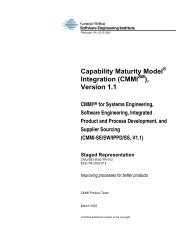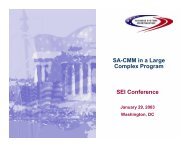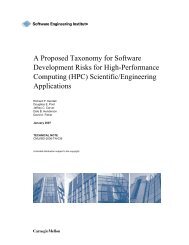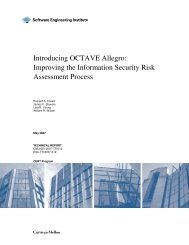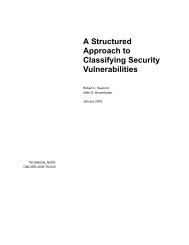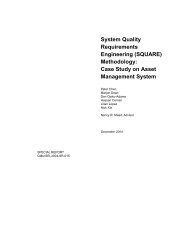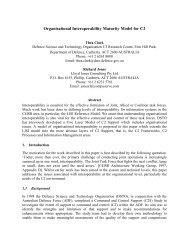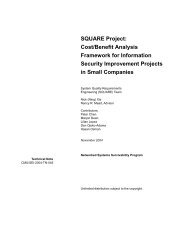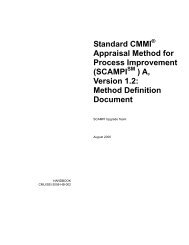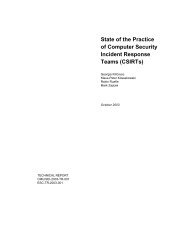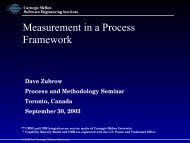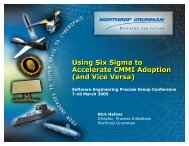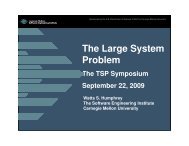SEI Professional Development Center - Software Engineering ...
SEI Professional Development Center - Software Engineering ...
SEI Professional Development Center - Software Engineering ...
Create successful ePaper yourself
Turn your PDF publications into a flip-book with our unique Google optimized e-Paper software.
Research, Technology, and System Solutions<br />
The <strong>SEI</strong> RTSS Program innovates software development for competitive advantage: with a focus<br />
on system structure and behavior, it creates and harnesses innovations for assured development,<br />
adaptation, and rapid deployment of software-reliant systems at all scales.<br />
Specifically, the RTSS Program works to<br />
• advance architecture technology and practices<br />
• advance software product line practice<br />
• develop principles and technology to understand, control, and<br />
bound the behavior of cyber-physical and social systems<br />
• develop strategies for robust mobile computing in tactical<br />
environments<br />
Accomplishments<br />
• Nearly two decades of leadership in<br />
software architecture<br />
• People from more than 800 organizations trained in<br />
<strong>SEI</strong> software architecture courses<br />
• <strong>SEI</strong> software-architecture-related certificates<br />
conferred to more than 1,700 people<br />
• More than 145,000 copies of our books on software<br />
architecture sold<br />
• More than 2,400 citations, in professional journal<br />
articles and conference papers by researchers, of the<br />
books used in <strong>SEI</strong> architecture curriculum since 2005<br />
• <strong>SEI</strong> Architecture Technology User Network (SATURN)<br />
Conference initiated in 2005 to bring together experts<br />
from around the world to exchange ideas and insights<br />
about developing, acquiring, and maintaining software<br />
and systems architecture<br />
• <strong>Software</strong> Product Line Conference (SPLC), a premier<br />
forum for practitioners, researchers, and educators,<br />
founded and cosponsored<br />
• Framework for <strong>Software</strong> Product Line Practice, internationally<br />
recognized reference model for software<br />
product lines, developed<br />
• Architecture Tradeoff Analysis Method (ATAM), Views<br />
and Beyond documentation approach, and other<br />
widely applied tools and methods for architecturecentric<br />
engineering developed<br />
• <strong>Software</strong> Architecture in Practice, the first text for<br />
software architecture practitioners, soon to be<br />
published in a third edition<br />
RTSS Technical Work Areas<br />
Architecture Practices (AP)<br />
The AP Initiative advances architecture technology and practices for<br />
incremental, cost-effective development and evolution of assured<br />
and flexible system capabilities at all scales. The AP team focuses<br />
on how to deploy a system rapidly without compromising the<br />
benefits of a robust architecture.<br />
Product Line Practice (PLP)<br />
The PLP Initiative works to make software product line development<br />
and acquisition a low-risk, high-return proposition by<br />
• maturing and codifying practices to manage variation across<br />
families of similar systems<br />
• helping customers to address key product line challenges<br />
• training developers, acquirers, and educators to use effective<br />
software product line principles and practices<br />
Cyber-Physical and Ultra-Large-Scale Systems (CP-ULS)<br />
The CP-ULS Initiative responds to the challenges of optimizing<br />
performance without compromising capabilities or safety in two<br />
research projects:<br />
• The Socio-Adaptive Systems project works with the human<br />
element in systems to enable optimal responses to changes in<br />
resource capacity. Using computational mechanism design to<br />
elicit information about changing needs and resources, a socioadaptive<br />
system computes optimal allocation of resources and<br />
optimizes a decentralized quality of service.<br />
• High-Confidence CPS demonstrates scalable algorithms for<br />
functional analysis of real-time embedded software and new<br />
resource-reclamation algorithms for multi-threaded tasks in<br />
multicore processors with non-uniform memory access. Combining<br />
these elements provides the ability to structure CPS with behavior<br />
that is more predictable.<br />
Advanced Mobile Systems (AMS)<br />
The AMS Initiative works to increase the flexibility of users at<br />
the tactical edge to respond to diverse missions and network<br />
infrastructures. Our approach employs a virtual-machine, peerto-peer<br />
architecture on a cloudlet and a thick client application<br />
on a handheld device to provide precise and tailorable context<br />
information at the tactical edge while using resources efficiently.<br />
EMAIL course-info@sei.cmu.edu PHONE 412.268.7622 WEB www.sei.cmu.edu/training 3



